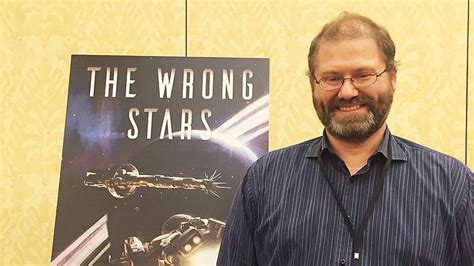Top 384 Robots Quotes & Sayings - Page 7
Explore popular Robots quotes.
Last updated on April 15, 2025.
The job market of the future will consist of those jobs that robots cannot perform. Our blue-collar work is pattern recognition, making sense of what you see. Gardeners will still have jobs because every garden is different. The same goes for construction workers. The losers are white-collar workers, low-level accountants, brokers, and agents.
I love science fiction but I don't like fantastic [cinema]. For example, if you have a magical ring and you can explode the world with it. What are we talking about? You know, it's not interesting. I don't like Lord of the Rings. Even Star Wars, for me, I don't understand this kind of story. But Alien, because the rules of the game are very precise, it could happen. I love science fiction. I have an idea about robots in the future.
It's one of the bases of all human existence - the relation between parents and children, whether biologically or metaphorically. It's something we can never get away from, even in a civilization where we're controlled by robots. It's the basic relationship between mature people who represent paternal and maternal figures and young people. It's universal - it's part of human existence. It's always been that way, and it will always be that way if humans remain around.
For my part, I think we need more emotion, not less. But I think, too, that we need to educate people in how to feel. Emotionalism is not the same as emotion. We cannot cut out emotion - in the economy of the human body, it is the limbic, not the neural, highway that takes precedence. We are not robots...but we act as though all our problems would be solved if only we had no emotions to cloud our judgement.
Surely, if we take on thinking partners - or, at the least, thinking servants - in the form of machines, we will be more comfortable with them, and will relate to them more easily, if they are shaped like humans. It will be easier to be friends with human-shaped robots than with specialized machines of unrecognizable shape. And I sometimes think that, in the desperate straits of humanity today, we would be grateful to have nonhuman friends, even if they are only the friends we build ourselves.
I've always enjoyed stories that take place in the future but my one disappointment was that the future books described never came. We're not on other planets, there are no flying cars, and the only robots we have in our homes just sweep the floor. So I wanted to write about a future that I thought could really happen. People ask me when I tell them the title of the book, 'Are we all dead?' The good news is, no. We're still here. And I even think the future in my book is strangely hopeful, although I'm sure there will be people who strongly disagree.
Who can keep us from recreating our life as we would like it to be-as it could, and should be? No one but ourselves can keep us from being artists, rather than marching forward like mere consumers, corporate robots, sheep. No one but ourselves can keep us from dancing with life instead of goose-stepping. In every moment recognizing our own creative imagination, the living picture we paint on the canvas of our lives. Everything is imagination. And imagination is freedom, but it can also be conditioning, bondage.
"One of the advantages of having laws is the pleasure one may take in breaking them. We here are not children, Mr. Gurgeh." Hamin waved the pipestem round the tables of people. "Rules and laws exist only because we take pleasure in doing what they forbid, but as long as most of the people obey such proscriptions most of the time, they have done their job; blind obedience would imply we are - ha!" - Hamin chuckled and pointed at the drone with the pipe - "no more than robots!"
Millions of people never analyze themselves. Mentally they are mechanical products of the factory of their environment, preoccupied with breakfast, lunch, and dinner, working and sleeping, and going here and there to be entertained. They don't know what or why they are seeking, nor why they never realize complete happiness and lasting satisfaction. By evading self-analysis, people go on being robots, conditioned by their environment. True self-analysis is the greatest art of progress.
I realize how myself and other people have started to almost fool ourselves that it's more important to us and more real than the real world, the offline world, and we value looking at our phone and pixels on a screen more than connecting eye to eye with a human being, which is terrifying to me because we're becoming robots.
When you go into a country like Libya where a large chunk of the population wants the old regime back you could end up with a protracted civil war. That we're now in a stalemate was both entirely predictable, and predicted. That we're now relying on drones is disturbing. How vital can a cause be if we're not willing to risk American lives to defend it, and instead use robots and remote control operators? It gets me back to the larger feeling about the intervention - there's just not a compelling reason for us to be involved.
Our point of view is, lets not be so elitist that we can't honor good, hard, dignified, ennobling work: people working with their hands, building things, putting up solar panels, weatherizing homes, working on organic agriculture, building wind farms. We don't have robots in society, so somebody has to do that work. Lets make sure that the people who can use that work get a chance to do it. I see that as a first step toward bigger and better things.
The New York Times is filled with Ivy League graduates and so is the Washington Post. I mean, it's all the same club. They may be Ivy League educated, but they're not smart. Their minds are closed. They actually are mind-numbed robots. They have been programmed all their lives. They're not even thinkers. These are people who have been programmed to believe what they believe. They are committed believers, not thinkers.
If I became lost in the multiverse, exploring infinite parallel dimensions, my only criterion for settling down somewhere would be whether or not I could find you: and once I did, I'd stay there even if it was a world ruled by giant spider-priests, or one where killer robots won the Civil War, or even a world where sandwiches were never invented, because you'd make it the best of all possible worlds anyway, and plus we could get rich off inventing sandwiches.
Some people think that, inevitably, every robot that does any task is a bad thing for the human race, because it could be taking a job away. But that isn't necessarily true. You can also think of the robot as making a person more productive and enabling people to do things that are currently economically infeasible. But a person plus a robot or a fleet of robots could do things that would be really useful.
Nature only goes so far. Nurture, what you raised on and what you ingest as a youngster, it really affects you when you grow up in really subtle, long drawn-out ways. And to find that, to hear that thing again all those years later and to realize that was the source, it's like, "What else has me twisted?" So now I'm going back to robots and cartoons; I go back to all this to see what got me the way that I am.
I've never recognized 'emo' as a genre of music. I always thought it was the most retarded term ever. I know there is this generic commonplace that every band that gets labeled with that term hates it. They feel scandalized by it. But honestly, I just thought that all the bands I played in were punk rock bands. The reason I think it's so stupid is that - what, like the Bad Brains weren't emotional? What - they were robots or something? It just doesn't make any sense to me.
The more I think about it, the more I realize that schools are just factories for turning out robots, that's all. They get you when your small and vulnerable and they take all the human parts away, bit by bit, until you're just a wind-up toy. Turn the key and set it running. And the toy goes to university, gets a job, settles down with someone nice.
The very comprehensibility of the world points to an intelligence behind the world. Indeed, science would be impossible if our intelligence were not adapted to the intelligibility of the world. The match between our intelligence and the intelligibility of the world is no accident. Nor can it properly be attributed to natural selection, which places a premium on survival and reproduction and has no stake in truth or conscious thought. Indeed, meat-puppet robots are just fine as the output of a Darwinian evolutionary process.
The idea that Hispanics or women or any other group of people think alike, vote alike? That's what Democrats want. They want mind-numbed robots who all think alike and who all vote alike. It's easy! You dumb them down, you get rid of critical thinking, and you just have a blob, basically, out there of people that look for the D on the ballot and pull the lever.
I'm partly somebody else trying to fit in and say the right things and do the right thing and be in the right place and wear what everybody else is wearing. Sometimes I think we're all trying to be shadows of each other, trying to buy the same records and everything even if we don't like them. Kids are like robots, off an assembly line, and I don't want to be a robot!
According to a recent study, depression is described as being the disease most destructive to humankind, largely because of the devastation it wreaks on our lives.... Yes, we could set up our minds to ignore our feelings and barricade ourselves from the winds and dust of the brain pattern. And we could become like robots, refusing to consider the passion and joys that could be ours. But then, we also might as well be dead.






















